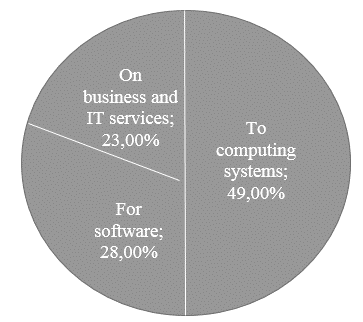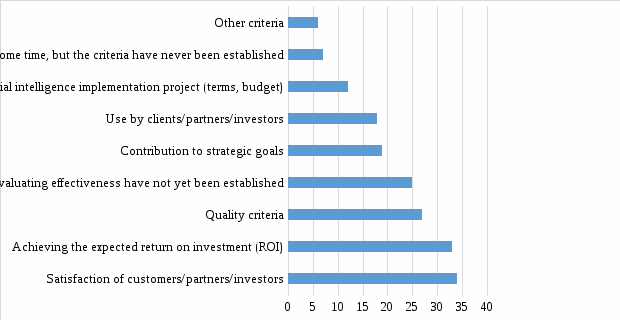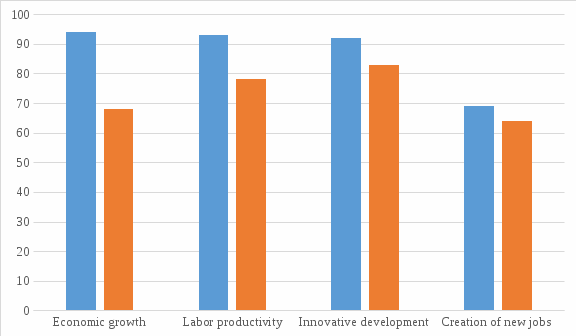Файл: Удк 65. 011. 56 Применение систем искусственного интеллекта в управлении предприятием.docx
ВУЗ: Не указан
Категория: Не указан
Дисциплина: Не указана
Добавлен: 27.04.2024
Просмотров: 16
Скачиваний: 0
ВНИМАНИЕ! Если данный файл нарушает Ваши авторские права, то обязательно сообщите нам.
Российской Федерации”// [Электронный ресурс]. URL:
https://www.garant.ru/products/ipo/prime/doc/72738946/
Статьи из электронных журналов
Искусственный интеллект (рынок России)// [Электронный ресурс]. URL:
https://www.tadviser.ru/index.php/ Статья : Искусственный интеллект ( рынок России )?
source=post_page---------------------------
Петров А.А., «Человек, искусственный интеллект и управление»// [Электронный ресурс].
URL: https://cyberleninka.ru/article/n/chelovek-iskusstvennyy-intellekt-i-upravlenie
Интернет-сайты
Официальный сайт Gridnine Systems.// [Электронный ресурс]. URL: https://gridnine.com/
Портал искусственного интеллекта.// [Электронный ресурс]. URL:
http :// www . aiportal . ru / news /13566 . html
APPLICATION OF ARTIFICIAL INTELLIGENCE SYSTEMS IN ENTERPRISE MANAGEMENT
Verbitskaya V.V, Sokolova Y.A.
South Russian institute of management RANEPA, Rostov-on-Don
This article analyzes the application of artificial intelligence systems in various areas of enterprise management. The positive aspects, as well as the problems of implementing artificial intelligence in the Russian market, are considered. The prospects for the development of this direction in the next 5 years are given, taking into account the increasing role of automated production and organization of work by the enterprise in its development and increasing competitiveness.
Keywords: artificial intelligence, electronic document management, enterprise management, automation, technologies.
Artificial intelligence is becoming the most important element of management in many organizations, fully changing the functions and mechanisms of management activities, decision-making system, relationships and communication in the enterprise. Therefore, the issue of implementing artificial intelligence systems in management is particularly relevant at this time.
Priority areas for the use and development of AI technologies are determined on the basis of national goals and strategic objectives defined by Presidential Decree No. 204 of May 7, 2018 "On National Goals and Strategic Objectives for the Development of the Russian Federation until 2024".
Also, Presidential Decree No. 490 of October 10, 2019 "On the Development of Artificial Intelligence in the Russian Federation" determines that the use of artificial intelligence technologies in the economy increases the efficiency of planning, forecasting and managerial decision-making processes.
Today, in the era of the digital economy, many companies are transforming, growing, and entering new markets. In order to keep the pace of business development at a high level, a flexible and modern approach to management is necessary. Consequently, the implementation of new technologies in the management service becomes relevant.
According to IDC analysts, Russian companies invested $172.5 million in the development of artificial intelligence technology in 2019 (Fig. 1).

Fig. 1. Investment in the creation of AI solutions
The financial sector of the economy invests the most in artificial intelligence: 41% of investments in 2019 were in them. It was followed by industries such as manufacturing (16%), wholesale and retail trade (14%), the public sector (6%), and other markets (23%).
Artificial Intelligence is the ability of a digital computer or computer-controlled robot to perform tasks normally performed by intelligent beings. The emergence of such technologies has been facilitated by the active development of this field, as well as, major advances in science. Artificial intelligence systems find their application in different aspects of business management, ranging from personnel management to complete processing of documents. Let's consider the principles of work of such systems on concrete examples.
Such software leaders as SAP, Microsoft, Veriato, IBM, Entelo, BluVision are developing artificial intelligence systems that help optimize the management issues of an enterprise. One of the leaders in the "digitalization" of HR management is SAP. To simplify these processes and increase productivity the software producer offers a number of solutions for companies, namely programs for training and professional development; adaptation and selection of working personnel; planning and analysis processes, etc. The software offered by the company is capable of reducing staff turnover by a third. Thanks to the ability to simulate the composition and cost of labor, the ability to assess the financial impact of staff becomes a reality. In this case, paper reporting is reduced by 72%, and companies' income increases by about 20%.
In addition to software that operates autonomously, there are entire organizations capable of coordinating the management activities of any enterprise, assuming all responsibilities for the implementation of AI systems. Let us look at the example of a Russian firm.
Gridnine Systems is a company that helps automate internal processes and customer interactions with the help of artificial intelligence solutions. GS has experience in developing and putting into commercial operation systems that use artificial intelligence technologies:
1) Intelligent dynamic system "Sales Manager Assistant" - Analyzing a large amount of historical and operative data, issues various recommendations, including those related to pricing.
2) Procurement planning system for a large branched network of regional warehouses - it takes into account a lot of factors and makes demand forecast for forecasting stock balances in warehouses.
3) Reporting and analytical systems - collects, analyzes and visualizes data to support management decision-making.
4) Flexible online system of recommendations for goods and services in the online store - takes into account a variety of marketing and commercial rules, as well as individual and generalized sales statistics.
AI technologies are used in the electronic document management system (EDMS), which eliminates the human factor in the performance of routine tasks. Artificial intelligence fully automates the process of document processing: document recognition, classification, document data collection, entering it into the registration card, sending a document for review, entering and collecting information about a new counterparty, etc.
There are several stages of AI-technology in the electronic document management system:
Stage 1 - document entry into the system from an electronic document exchange operator, e-mail, streaming scanner;
The 2nd stage is the process of text recognition and extraction by artificial intelligence. The result is a PDF document with the recognized text;
Stage 3 - classification of documents in the system is carried out using multi-format AI algorithms:
1) by type of document (invoice, contract, letter),
2) by place of registration, category, journal, source of origin;
The 4th stage is the process of document extraction.
The use of artificial intelligence systems may soon replace humans altogether, their skills in management and negotiation. Scientists from the Massachusetts Institute of Technology have developed an artificial intelligence system capable of maintaining relationships and negotiating more effectively than humans. Using a special algorithm, the researchers programmed the machines and then tested them in different interaction situations. In most tests, the system outperformed humans in finding compromises that benefited both parties. The positive results obtained may have a long-term perspective on human relationships.
As for the Russian experience of using AI technologies, the insurance company SOGAZ can boast particular successes, having implemented a technological solution that makes it possible to more accurately predict the amount of medical care received by new corporate clients under VHI and the corresponding payments to medical institutions. This technology uses predictive models that predict the behavior of the insured on the basis of more than 70 attributes. With their help, SOGAZ underwriters can calculate within a few minutes with what frequency, in which clinics and to what extent the insured will receive medical care. These digital technologies made it possible to achieve a cumulative economic effect of almost 1 billion rubles in 2019.
During the analysis of areas of application of artificial intelligence systems in enterprises, the following positive aspects of management based on these technologies can be highlighted:
1) The ability to scale the business without distorting cost growth. Automatic processing of requests and selection of offers with a sharp increase in the number of customers will not increase transaction costs;
2) Customization of products and services when serving a huge number of customers. Smart control system individualizes the product automatically based on previous orders and catalog views by the client;
3) ensuring objectivity of management decisions through their automation, which leads to a reduction of decision errors made by subjective individuals;
4) monitoring the state of the market. Smart management technologies are able to monitor changes and evaluate the dynamics of all market processes (appearance of a new product, change in consumer preferences, etc.).
But despite the obvious benefits of introducing artificial intelligence into the work of the enterprise (Fig. 2), it should be noted that companies on the way to digitalization of their activities face a number of problems.

Fig. 2 Criteria used to evaluate the effectiveness of implementation
The deterrent to the introduction and use of AI-based technologies is the lack of digital understanding, thinking and knowledge among many employees and management personnel, the lack of investment, ICT specialists and the size of the company that determines the volume of operations. According to the research of the Project Office for the implementation of the national program "Digital Economy" of the All-Russian Center for the Study of Public Opinion (VTsIOM) and the Analytical Center under the Government of Russia, about 43% of Russian businesses do not turn to artificial intelligence in their work and do not plan to use it in the future. There are different reasons for the revealed results of the research. About 37% of respondents said that they have no need for such technologies, 28% said that the sphere of their activity does not involve the use of AI. About 11% admitted that the reason for not using the relevant technologies is the lack of sufficient knowledge about them, and 8% said they are embarrassed by the rather high cost of their implementation. Another 6% refuse to use because they have a small company, and 4% because there is little development of such technologies in Russia. About 4% simply do not trust modern technology and prefer human labor.
So, we can identify three main reasons why businesses refuse to use artificial intelligence technologies. The first is the lack of such clear cases that would prove the effectiveness of these technologies. The second reason is the lack of available solutions and mass products in this area. The third reason is the lack of competences on the market.
Thus, conducting a study of the experience of implementing artificial intelligence in enterprises, having considered its possibilities, it is worth stating that artificial intelligence in the field of management has both difficulties and great prospects for development. Modern software solutions create good opportunities for growth and improvement of companies. The use of new technologies to optimize management processes in companies is justified (Fig. 3).

Fig. 3. Expected impact of AI technology development over 5 years (2019-2024), %
In addition to the fact that artificial intelligence facilitates the work process by performing tasks based on laid down algorithms, it contributes to a more efficient use of employee time, which can be aimed at solving global issues that only humans can cope with.
List of references:
Regulatory documents
Presidential Decree of October 10, 2019 № 490 "On the development of artificial intelligence in the Russian Federation" // [Electronic resource]. URL: https://www.garant.ru/products/ipo/prime/doc/72738946/
Articles from electronic journals
Artificial Intelligence (Market of Russia) // [Electronic resource]. URL: https://www.tadviser.ru/index.php/Статья:Искусственный_интеллект_(рынок_России)?source=post_page---------------------------
Petrov A.A., "Man, Artificial Intelligence and Management"// [Electronic resource]. URL: https://cyberleninka.ru/article/n/chelovek-iskusstvennyy-intellekt-i-upravlenie
Internet sites
Official website of Gridnine Systems. // [Electronic resource]. URL: https://gridnine.com/
Artificial Intelligence Portal. // [Electronic resource]. URL: http://www.aiportal.ru/news/13566.html


